New Round of Free At-Home COVID Tests Now Available
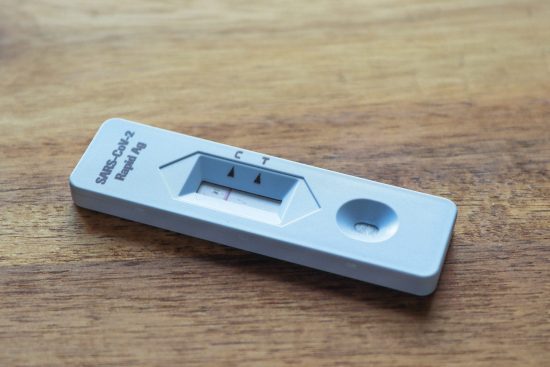
A federal program that provides free at-home COVID-19 tests, including tests with enhanced accessibility, has resumed.
Another round of free at-home COVID-19 tests is now available.
Starting in late September 2024, every U.S. household can order four free COVID-19 rapid tests.
Visit https://special.usps.com/testkits to place an order. (The website is available in Spanish and Chinese.) Here’s what you need to know:
- Each order includes four individual rapid antigen COVID-19 tests.
- Orders will ship free starting Sept. 30, 2024.
If you need help placing an order, you can call (800) 232-0233 or (888) 720-7489 (TTY).
More accessible tests are also available for individuals who are blind or have low vision as well as people who have low manual dexterity. These tests are available while supplies last.
You can visit https://special.usps.com/testkits/accessible to order the accessible tests. Here is what you need to know:
- Each order includes one carton of four rapid antigen COVID-19 tests.
- Supplies are limited. Please do not order the accessible tests if you have options for using the standard tests.
- Orders will ship free starting the week of Sept. 30, 2024.
Visit the Administration for Community Living (ACL) Accessible Tests page fore more details about the features that make these tests more accessible.
Individuals with disabilities can also contact the Disability Information and Access Line (DIAL) for help with available testing options, including ordering free at-home test kits.
Contact DIAL Monday through Friday from 7 a.m. to 8 p.m. through:
- Call, text or videophone at (888) 677-1199
- Email DIAL@usaginganddisability.org
- Start an online chat with an information specialist
- Connect to an agent in American Sign Language
For more information about COVID-19 test options, visit www.covidtests.gov/.
To learn more about how to access low- or no-cost COVID-19 tests from the federal government, you can contact any of these programs:
- A Health Resources and Services Administration (HRSA) health center
- A Test to Treat site
- An Increasing Community Access to Testing (ICATT) location near you
Still have old COVID-19 tests at home? You can check the FDA’s website to see if your COVID-19 tests have extended expiration dates.
Free At-Home COVID Test Program Resumes

*Please see our updated news post, “New Round of Free At-Home COVID Tests Now Available,” for the most up-to-date information about free COVID-19 test availability. *
A federal program that provides free at-home COVID-19 tests is once again available.
Starting Sept. 25, 2023, every U.S. household can order four free COVID-19 rapid tests through the U.S. Postal Service (USPS).
Visit www.covid.gov/tests to place an order. (The website is available in Spanish and Chinese.) Here’s what you need to know:
- There is a limit of one order per residential address.
- One order includes four individual rapid antigen COVID-19 tests.
- Orders will ship free starting the week of Oct. 2, 2023.
If you need help placing an order, you can call (800) 232-0233 or (888) 720-7489 (TTY).
The USPS is also distributing more accessible tests for individuals who are blind or have low vision.
Starting Sept. 25, 2023, you can visit https://special.usps.com/testkits/accessible to order one set of 12 free at-home tests with enhanced accessibility (while supplies last). Here is what you need to know:
- There is a limit of one order per residential address.
- Each order includes 12 accessible rapid-antigen tests.
- Supplies are limited. Please do not order the more accessible tests if you have options for using the standard tests.
- The tests work with a compatible Bluetooth-enabled smartphone and a free app to provide users with audible instructions and audible test results.
- Orders will ship free starting the week of Oct. 2, 2023.
Individuals with disabilities can also contact the Disability Information and Access Line (DIAL) for help with available testing options, including ordering free at-home test kits.
Contact DIAL Monday through Friday from 7 a.m. to 8 p.m. through:
- Call, text or videophone at (888) 677-1199
- Email DIAL@usaginganddisability.org
- Start an online chat with an information specialist
- Connect to an agent in American Sign Language
The U.S. government will also continue to make COVID-19 tests available to uninsured individuals and underserved communities through its existing outreach programs.
To learn how to access low- or no-cost COVID-19 tests from the federal government, you can contact any of these programs:
- A Health Resources and Services Administration (HRSA) health center
- A Test to Treat site
- An Increasing Community Access to Testing (ICATT) location near you
Still have old COVID-19 tests at home? You can check the FDA’s website to see if your COVID-19 tests have extended expiration dates.
You can also visit www.covid.gov/tests for more details about free testing sites by state, frequently asked questions about at-home tests and more.
Important Reminders: End of Public Health Emergency and Return to In-Person Visits
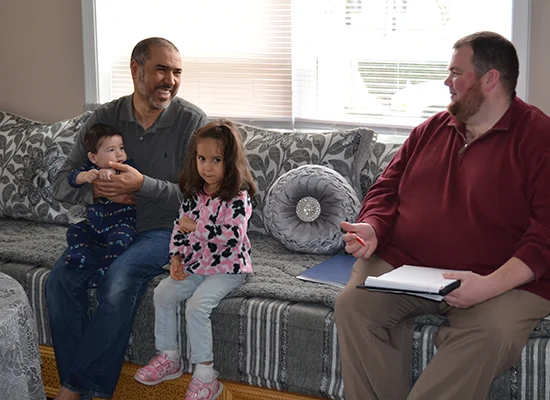
An overview of key changes affecting all Division of Specialized Care for Children participants now that the public health emergency is over
The public health emergency due to the COVID-19 pandemic ended on May 11, 2023.
This ending brings a variety of changes for our Division of Specialized Care for Children (DSCC) participant families. These changes include a return to in-person visits from DSCC Care Coordinators, an end to verbal signatures and more.
The following sections give an overview of key points and important dates to remember:
- Reminders for All DSCC Program Participants
- Reminders for Home Care Program Participants
- Important Medicaid/Insurance Updates for All DSCC Participants in Medicaid
- Contact Reminders for All DSCC Program Participants
Reminders for All DSCC Program Participants
Return to In-Person Visits
Meeting in person with our participants and families is an important part of care coordination. The public health emergency allowed face-to-face visits to occur virtually. Now that the public health emergency has ended, we must return to face-to-face meetings with our participants.
Your DSCC Care Coordinator will work with you in advance to schedule your next in-person/home visit. We understand that in-person visits with your Care Coordinator may be a change for you and your family. We paused these visits for several years during the public health emergency (though many families continued to meet with their Care Coordinator during the pandemic).
Seeing you in person helps us get to know you and your family better. It can also help improve your connection with your DSCC Care Coordinator. Our partnership with Medicaid and Medicaid managed care plans also requires us to meet with you in person. If you have any concerns about in-person visits, please talk to your Care Coordinator. We will work with you to see how to best accommodate your preferences.
Verbal Signatures
The public health emergency allowed your Care Coordinator to receive necessary signatures verbally. As of May 11, 2023, it is a federal rule that DSCC can no longer accept verbal signatures.
- Electronic signature options (such as through Adobe) remain an option for families when signing DSCC documents.
Reminders for Home Care Program Participants
End of Continued Medicaid and Program Enrollment for Those Found Ineligibile for Services
Starting April 1, 2023, DSCC began working with the Illinois Department of Healthcare and Family Services (HFS) to reassess all Home Care Program participants who received a notice of ineligibility for the program since March 1, 2020. Now that the public health emergency has ended, HFS’ notices accurately list the approved level of services for you or your child.
- If you or your child received a notice of ineligibility for services since March 1, 2020, your services will remain in place until HFS completes a reassessment. The reassessment looks at your updated and current medical documentation and will occur before Sept. 30, 2023.
- If you or your child received a notice of reduced nursing hours since March 1, 2020, your Care Coordinator will complete the next reassessment of services at your regularly scheduled renewal time. Services will remain in place until this reassessment occurs.
Reminders for Individuals in the Non-Waiver Program (Nursing and Personal Care Services)
Now that the public health emergency has ended, all individuals who turn 21 and are not on the Home and Community-Based Services Waiver for Those Who Are Medically Fragile Technology Dependent (MFTD), will not be eligible for services. If you or your child were on non-waiver services and turned 21 between the dates of March 1, 2020, and March 31, 2023, services will end on Sept. 30, 2023. Your Care Coordinator will work with you to ensure you or your child is set with an alternate state waiver, such as the Division of Rehabilitative Services (DRS), if applicable.
For all non-waiver participants under age 21, you must continue to have Medicaid coverage to receive Home Care services. It is important that you submit the redetermination form from Medicaid to keep your coverage. If you fail to meet Medicaid eligibility or do not respond in time, HFS will cancel your Medicaid case. Your Home Care services will then also end.
Additional COVID-19 Respite Allotment
During the public health emergency, HFS approved an additional 336 hours of respite to use before the regular respite allotment. This additional respite is for all Home Care MFTD waiver participants. Starting Nov. 11, 2023, this additional COVID respite will expire. All respite used after Nov. 11, 2023, will come from the standard respite allotment.
Personal Protective Equipment (PPE)
During the public health emergency, nursing agencies were reimbursed for PPE when actively staffing nurses in the home. The PPE is for the nurses to use while caring for participants. This reimbursement of PPE supplies to the nursing agencies will end on Nov. 11, 2023.
Nursing Supervisory Visits
Nursing agencies resumed in-person supervisory visits in November 2020. Effective May 11, 2023, there can be no exceptions to replace in-person supervisory visits.
Important Medicaid/Insurance Updates for All DSCC Participants in Medicaid
These next sections explain important Medicaid updates now that the public health emergency and continuous Medicaid coverage period has ended. The end of the public health emergency may also affect your Medicaid coverage or your private health insurance coverage.
No More Copays or Premiums for Medicaid
Most Medicaid programs no longer have premiums or copays. All Kids Assist, Aid to the Aged Blind and Disabled (AABD) and Adult Medicaid do not have monthly premiums or copays for services. All Kids Premium 1, Premium 2 and Share programs are all called All Kids Assist now.
Medical Redetermination for Medicaid
Redetermination is when Medicaid looks to see if you are still eligible. They look at your residency, monthly income and other criteria to decide if you still qualify.
Medicaid sent forms to some members as early as May 2023. They will not complete redetermination on all cases at the same time. They will make the redeterminations over several months. This means that your Medicaid redetermination could happen now or later, even next year. It is important to make sure Medicaid has your current address. You can report your address online at Medicaid.illinois.gov or call (877) 805-5312. We also have a news post with more details about how to update your address.
Please watch your mail for letters from Medicaid.
Once you receive your redetermination notice, you will have about a month to respond. Medicaid may ask for more information about your income, residency or other information. If Medicaid asks for more information and you do not respond, your Medicaid coverage ends. You can return the redetermination in several ways:
- Online at ABE.illinois.gov using Manage My Case. Manage My Case is the quickest way to complete your redetermination.
- By mail.
- In person at a local Illinois Department of Human Services (DHS) Family Community Resource Center.
- By phone.
If you are in a Medicaid managed care plan (MCO), please remember the MCO does not do the redetermination. Medicaid does redetermination reviews. If you do not qualify for Medicaid anymore, your coverage ends. If you are still eligible, you keep your Medicaid coverage.
Don’t risk losing your health insurance. Please update your address with Illinois Medicaid. It’s easy, fast and free:
- Call (877) 805-5312 from 7:45 a.m. to 4:30 p.m., Monday through Friday.
- Visit medicaid.illinois.gov.
- If you use a TTY, call (877) 204-1012.
Please contact your DSCC Care Coordinator if you have questions about Medicaid redetermination.
Telehealth Coverage
Telehealth coverage for Medicaid (and other insurances) is a permanent change and will continue after the public health emergency to give Medicaid time to review for any future changes. You can review the HFS Provider Notice issued May 9, 2023, on Telehealth to learn more.
An Illinois law signed in 2021 requires insurance to cover telehealth through 2027. This law does not require that practitioners or providers offer telehealth services. Therefore, your providers may not offer telehealth care. The law only says that insurance must pay providers for telehealth care if they provide it.
Pharmacy Billing and Prior Approval Requirements
Pharmacy billing and prior approval requirements for Medicaid will resume. There were many flexibilities that allowed Medicaid members to get medications. These include overriding the refill too soon and waiving requirements for the preferred drug list, quantity and brand limits. If you go to the pharmacy and they tell you that you can’t get your medications, ask your doctor to submit a prior approval to Medicaid. You can review the HFS Provider Notice issued May 3, 2023, on Pharmacy Billing to learn more. Contact your DSCC Care Coordinator for more help.
DME and Therapy Prior Approval Requirements
DME and therapy prior approval requirements for Medicaid will resume. There are some services that Medicaid did not require a prior approval for during the public health emergency. These services include therapy, home health and some durable medical equipment (DME). It is important for your providers to get a prior approval so that Medicaid reviews medical eligibility for the services. You can review the HFS Provider Notice issued April 4, 2023, on Prior Approval Requirements for more details. Contact your DSCC Care Coordinator for more help.
COVID-19 Tests, Treatment, and Vaccines
Uninsured individuals will no longer get access to special COVID-19 Medicaid eligibility which included testing, services, treatment, and vaccine administration during the public health emergency. You can view the HFS Provider Notice issued May 9, 2023, on Uninsured Population Special COVID-19 Coverage. Medicaid members who do have eligibility will continue to be able to access treatment, testing and vaccines.
Those with private insurance should also be able to continue to access treatment and vaccines as outlined by their plan.
Insurance plans will no longer cover over-the-counter tests for COVID-19 for free. Generally, a doctor will need to order the test and provide them in an office or similar facility. This may vary from plan to plan. You should call your insurance plan if you have questions. There may also be community organizations or public health departments still distributing COVID-19 tests and related services, such as vaccines, for free.
Extension of COBRA
During the public health emergency, there was an extension of election and notice deadlines for someone to take COBRA after losing or leaving a job. That will expire 60 days after May 11, 2023.
Temporary Special Enrollment Period
For individuals who no longer qualify for Medicaid after they go through redetermination, there is a special open enrollment period through the federal health insurance marketplace to purchase private insurance. It will extend from March 31, 2023, to July 31, 2024. This is only for people with a special qualifying event, such as losing coverage. Otherwise, the regular open enrollment period will be in November and December for individuals who need to enroll in private insurance through the marketplace. The Illinois website is GetCovered.illinois.gov and the federal website is HealthCare.gov.
Questions? Contact Us!
As a DSCC participant family, you can contact us with any questions or support your family needs.
Please note the best way to reach your care coordination team or any DSCC office is through our toll-free number of (800) 322-3722.
You can use this number to dial your Care Coordinator’s direct extension or to have our Customer Service Representatives connect you with the right person/team.
We have updated our phone system and ask everyone to use the (800) 322-3722 number as the simplest and fastest way to reach us.
Our office hours are 8 a.m. to 4:30 p.m. Please talk to your Care Coordinator if you have a need to speak outside of business hours.
You may also reach us through our general dscc@uic.edu inbox or use our Contact Us or Request a Callback forms on our website.
Please talk with your Care Coordinator if you have more questions or need to update your communication preferences.
We are thankful for your partnership throughout the changes related to the end of the pandemic and public health emergency. Our team will continue to help support your family and connect you with the right services and resources.
Important Updates on the End of Continuous Medicaid Coverage and Appendix K
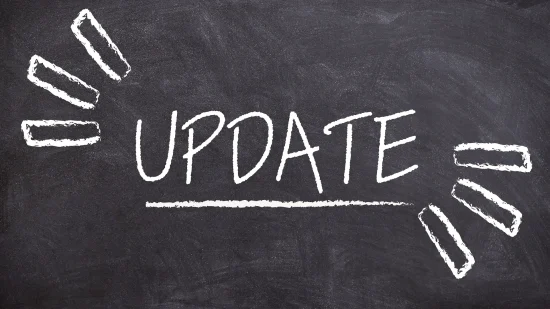
Key dates to know and an overview of the impact on DSCC participants and families
We are starting to prepare for the end of the public health emergency due to the COVID-19 pandemic. We’ve put together important information about how it will affect our Division of Specialized Care for Children (DSCC) participants and their families.
When the public health emergency took effect in 2020, the federal government allowed continuous Medicaid coverage and flexibilities for individuals receiving services through a Medicaid waiver. The federal government has signaled that the public health emergency will end on May 11, 2023. Please note the federal Centers for Medicare and Medicaid has not yet confirmed this date in writing.
We want to keep our participants as up-to-date as possible and will let you know if this date changes. In the meantime, we want to explain what changes will occur once the public health emergency and continuous Medicaid enrollment end.
The following sections give an overview of:
- The end of continuous Medicaid coverage
- The changes for all DSCC participants and families
- The impact on those enrolled in the Home Care Program
End of Continuous Medicaid Coverage
When the public health emergency began in 2020, the federal government allowed for continuous Medicaid coverage. This flexibility meant no one would lose Medicaid coverage during this time. The federal government is now ending continuous Medicaid coverage on March 31, 2023.
Starting April 1, Illinois Medicaid must review eligibility for all Medicaid cases. This process is called redetermination. Redetermination is when Medicaid looks to see if you are still eligible. They look at your residency, monthly income and other criteria to decide if you still qualify.
Medicaid will send forms to some members as early as May 2023. They will not complete redetermination on all cases at the same time. They will make the redeterminations over several months. This means that your Medicaid redetermination could happen in May or later this year.
It is important to make sure Medicaid has your current address. You can report your address online at Medicaid.illinois.gov or call (877) 805-5312. We also have a news post with more details about how to update your address. Please watch your mail for letters from Medicaid.
Once you receive your redetermination notice, you will have about a month to respond. Medicaid may ask for more information about your income, residency, or other information. If Medicaid asks for more information and you do not respond, your Medicaid coverage ends. You can return the redetermination in several ways:
- Online at ABE.illinois.gov using Manage My Case. Manage My Case is the quickest way to complete your redetermination.
- By mail.
- In person at a local Illinois Department of Human Services (DHS) Family Community Resource Center.
- By phone.
If you are in a Medicaid managed care plan (MCO), please remember the MCO does not do the redetermination. Medicaid does redetermination reviews. If you do not qualify for Medicaid anymore, your coverage ends. If you are still eligible, you keep your Medicaid coverage.
Don’t risk losing your health insurance. Please update your address with Illinois Medicaid. It’s easy, fast and free:
- Call (877) 805-5312 from 7:45 a.m. to 4:30 p.m., Monday through Friday.
- Visit medicaid.illinois.gov.
- If you use a TTY, call (877) 204-1012.
Please contact your DSCC Care Coordinator if you have questions about Medicaid redetermination.
Changes for All DSCC Program Participants:
- In-Person Visits: The public health emergency has allowed flexibility for in-person visits. As the public health emergency ends, DSCC must resume all in-person visits by Nov. 11, 2023. Your DSCC Care Coordinator will work with you to schedule your next in-person/home visit.
- Verbal Signatures: The public health emergency also allowed your Care Coordinator to receive necessary signatures verbally. As the public health emergency ends, we can no longer accept verbal signatures beginning May 11, 2023.
Impact on DSCC Participants in the Home Care Program:
The COVID-19 public health emergency has allowed several flexibilities for those in the Home Care Program in two separate areas:
- Continuous Medicaid and program enrollment for those found ineligible for services beginning March 1, 2020
- Appendix K flexibilities (Appendix K is an emergency coverage document for individuals receiving services through a Medicaid waiver.)
The following is important information about how the end of the public health emergency will affect Home Care Program participants.
End of Continued Medicaid and Program Enrollment for Those Found Ineligible for Services:
- There have been no reductions or loss of eligibility for Home Care participants since March 1, 2020. In 2022, the federal government separated the continuous Medicaid enrollment coverage provision from the public health emergency. As a result, continuous Medicaid coverage will end on March 31, 2023.
Starting April 1, 2023, DSCC will work with the Illinois Department of Healthcare and Family Services (HFS) to determine eligibility. We will reassess all Home Care Program participants who received a notice of ineligibility for the program since March 1, 2020. If you or your child received a notice of ineligibility for services since then, your services will remain in place until we complete a reassessment. The reassessment will look at your updated and current medical documentation. This includes individuals who appealed and were still deemed ineligible for services. Based on the new reassessment, HFS will send you an updated notice. This notice will state whether you or your child are eligible for Home Care services. Your DSCC Care Coordinator will work with you to complete a reassessment before Sept. 30, 2023.
- If you or your child received a notice of reduced nursing hours since March 1, 2020, your Care Coordinator will complete the next reassessment of services at your regularly scheduled renewal time. Services will remain in place until this reassessment occurs. After this reassessment, HFS will send you a new notice based on updated and current medical documentation. The notice will list the new level of services.
More Information for Individuals in the Non-Waiver Program (Nursing and Personal Care Services):
- You will no longer receive Home Care Program nursing services if you or your child turned 21 and are not on the MFTD waiver but still receive nursing. Your nursing services will end on Sept. 30, 2023. Your Care Coordinator will work with you to ensure you, or your child is set with an alternate state waiver, such as the Division of Rehabilitation Services (DRS), if applicable. If you or your child will turn 21 on or after March 31, 2023, services will end on the date indicated on the current notice of ineligibility.
- For all non-waiver participants under age 21, you must continue to have Medicaid coverage to receive Home Care services. It is important that you submit the redetermination form from Medicaid to keep your coverage. If you fail to meet Medicaid eligibility or do not respond in time, HFS will cancel your Medicaid case. Your Home Care services will then also end. For more information on the Medicaid redetermination timeline, see the dates above.
Appendix K Flexibilities
Appendix K is an emergency coverage document for individuals receiving services through a Medicaid waiver. Appendix K provisions took effect on March 1, 2020, to give flexibility to Home Care participants. Appendix K is tied to the public health emergency, which is determined by the federal government.
As we noted above, the federal government has indicated the public health emergency will end on May 11, 2023. Appendix K provisions would then continue for six months after the public health emergency ends. Therefore, Appendix K flexibilities will end on Nov. 11, 2023. However, DSCC worked with HFS to make two flexibilities permanent. Here are more details on what will change and what will remain in place:
- Licensed (RN or LPN) parent/LRA paid caregivers: Parents/legally responsible adults (LRAs), including foster parents, can continue to provide skilled nursing services to their child if they hold an active registered nurse (RN) or licensed practical nurse (LPN) license. DSCC sent a separate notice on this provision remaining permanent, which includes details on guidelines. (You can also read our news post on Home Care Program Changes Give Families More Flexibility and Support.)
- Overtime: Nursing agencies will permanently receive payment for providing overtime hours to Home Care participants. DSCC sent a separate notice on this provision remaining permanent, which includes details on guidelines. (You ou can also read our news post on Home Care Program Changes Give Families More Flexibility and Support.)
- Additional COVID-19 respite allotment: During the public health emergency, HFS approved an additional 336 hours of respite to use before the regular respite allotment. This additional respite is for all Home Care MFTD waiver participants. Starting Nov. 11, 2023, this additional COVID respite will expire. All respite used after Nov. 11, 2023, will come from the standard respite allotment.
- Personal Protective Equipment (PPE): During the public health emergency, nursing agencies were reimbursed for PPE when actively staffing nurses in the home. The PPE is for the nurses to use while caring for participants. This reimbursement of PPE supplies to the nursing agencies will end on Nov. 11, 2023.
- Nursing Supervisory Visits: Nursing agencies resumed in-person supervisory visits in November 2020. Effective May 11, 2023, there will be no exceptions allowed to replace in-person supervisory visits.
Please contact your DSCC Care Coordinator at (800) 322-3722 if you have questions or are unsure how this information may impact your family.
We are thankful for your partnership throughout the pandemic and public health emergency. Our team will continue to help support your family and connect you with the right services and resources.
Medicaid Members – Update Your Address
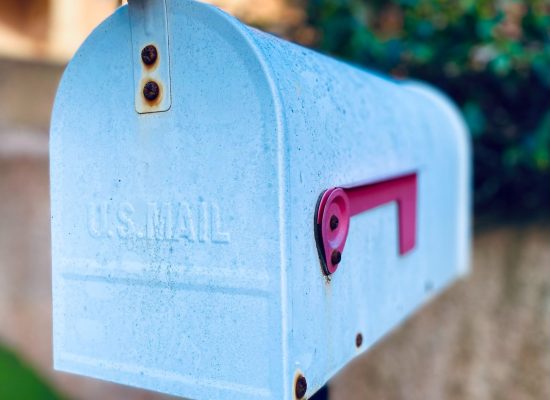
Don’t risk missing important paperwork and losing Medicaid coverage
Do you get health insurance through Medicaid?
Be sure your address is up-to-date so you don’t risk losing coverage.
The Illinois Department of Healthcare and Family Services (HFS) needs every Medicaid member to update their mailing address. This step can ensure you receive important paperwork about your benefits.
Medicaid pays for your health care, like visits to your doctor and your medicine. Updating your address can help you avoid surprises and get critical information about your insurance.
We urge all Division of Specialized Care for Children (DSCC) participant families who receive Medicaid to make sure their contact information is current.
You can update your address in several easy steps:
- Call the HFS hotline at (877) 805-5312 from 7:45 a.m. to 4:30 p.m. Monday through Friday
- Contact HFS via TTY at (877) 204-1012
- Fill out a quick online form at medicaid.illinois.gov.
To keep your Medicaid coverage, be sure to use an address where mail can always reach you.
For instructions in other languages, please visit HFS’ Address Update Messaging Toolkit webpage.
It’s been two years since HFS has asked Medicaid members to update their contact information. As the COVID-19 public health emergency continues, Medicaid members can stay insured without confirming all eligibility requirements.
Plans are underway to eventually end the public health emergency. An exact date is not yet known.
Once the date is set, HFS will mail important information about how to keep your Medicaid coverage.
Please update your address right away. The process is fast, easy and free.
We will share more details about the end of the public health emergency once they are available.
If you have questions or concerns, please contact your DSCC Care Coordinator. You can call our offices at (800) 322-3722.
Participant Families: Share Your Preference for In-Person Visits
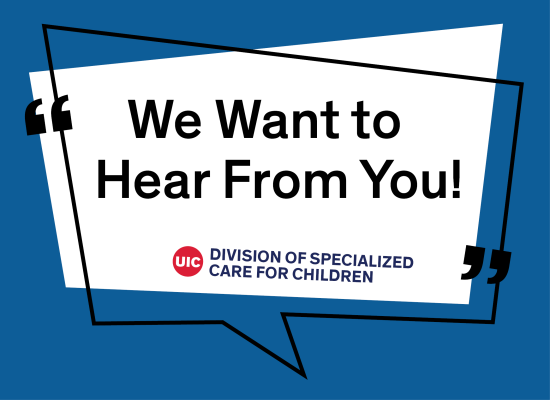
Complete a short survey to share your input and comfort level
As we move out of the pandemic phase of COVID-19, we’re planning for how to best support our participant families. These plans include how our Division of Specialized Care for Children (DSCC) team meets with families.
We want to know how you and your family feel about returning to in-person meetings and home visits.
You can click on this survey link to share your input. The survey is only six questions and shouldn’t take long to complete.
The survey is available in English and Spanish. It will be open through March 25.
Our goal is to serve you and your family in the safest and most comfortable way possible. Your survey responses will help us understand your comfort level and plan accordingly.
We appreciate your time and feedback!
We also encourage you to check our COVID-19 Resource Directory often for the latest information on testing options, assistance programs, health guidance and more.
Our next “Resource Roundup” newsletter will go out later this month. It highlights recent additions and updates to our Resource Directory as well as news and upcoming events. Fill out this brief subscription form to join our newsletter mailing list.
If you need help with specific needs or have questions about available resources, please contact your DSCC Care Coordinator.
Free At-Home COVID-19 Test Options for Families

* Please see our updated news post, “New Round of Free At-Home COVID Tests Now Available,” for the most up-to-date information about free COVID-19 test availability. *
If you need a COVID-19 test, there are many ways you can test at home for free.
COVID-19 home test kits are available at no cost by mail or pick-up at specified locations.
You may also be eligible for insurance reimbursement or Medicaid coverage at participating pharmacies. Here is a summary of the current options:
- Every home in the United States is eligible to order another round of free at-home tests through the U.S. Postal Service (USPS) at https://special.usps.com/testkits. Please note:
- Limit of one order per residential address.
- Your order will include four individual rapid antigen COVID-19 tests.
- Orders will ship free.
- For those who cannot access the internet or need help placing an order:
- Call (800) 232-0233 or the TTY line at (888) 720-7489 to get help in English, Spanish and more than 150 other languages.
- Call (800) 232-0233 or the TTY line at (888) 720-7489 to get help in English, Spanish and more than 150 other languages.
- USPS is also distributing more accessible tests for individuals who are blind or have low vision. The tests work with a compatible Bluetooth-enabled smartphone and a free app to provide users with audible instructions and audible test results. You can order these accessible tests at https://special.usps.com/testkits/accessible or by calling (800) 232-0233. Please note:
- There is a limit of one order per residential address.
- Each order includes 12 accessible rapid-antigen tests.
- Supplies are limited. Please do not order the more accessible tests if you have options for using the standard tests.
- Orders ship free while supplies last.
- Free COVID-19 rapid tests are available for vulnerable Illinoisans. The Illinois Department of Public Health (IDPH) is distributing at-home, over-the-counter COVID-19 rapid antigen tests to economically disadvantaged Illinois families in zip codes outside the city of Chicago. Tests are available on a first-come, first-served basis and will be delivered to your home address. To learn if your household is eligible for one package of five tests visit the Project Act website.
- Note you can find free COVID-19 testing locations on IDPH’s testing locator page.
- Note you can find free COVID-19 testing locations on IDPH’s testing locator page.
- If you have health insurance through an employer or Marketplace, your insurance will pay you back for eight at-home tests each month for each person on your plan.
- The Illinois Department of Healthcare and Family Services (HFS) will allow Medicaid-participating pharmacies to prescribe and bill for COVID-19 home test kits.
- This coverage went into effect on Jan. 1, 2022, and applies to Medicaid fee-for-service and HealthChoice Illinois managed care plans.
- Individuals with disabilities can also contact the Disability Information and Access Line (DIAL) for help with available testing options, including ordering free at-home test kits.
- Contact DIAL Monday through Friday from 8 a.m. to 7 p.m. at (888) 677-1199 or email DIAL@usaginganddisability.org.
- Individuals who are deaf and hard of hearing can reach DIAL using the 711/Video Relay Service (VRS).
You may also visit www.covidtests.gov/ to see where at-home tests are available for sale. The website includes a list of free testing sites available by state. It also provides information about other testing resources.
If you have questions about testing your child, this article from HealthyChildren.org gives a helpful overview of the different types of COVID-19 tests available and what parents need to know.
Your child’s pediatrician can help you determine when testing is a good idea and which type of test would be best. Please contact their office with any questions.
For more information on testing options, assistance programs and caregiver support, visit the Division of Specialized Care for Children’s COVID-19 Resource Directory.
DSCC Participant Opens Community Pet Pantry
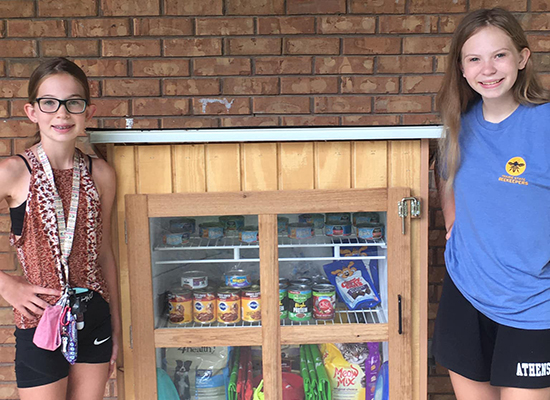
Emma Wiker’s community effort helps local pets stay fed and cared for during the COVID-19 pandemic.
For six years, Emma Wiker has run the Animal Abusive Protection Program to raise money for abused or abandoned animals in Menard County.
The 15-year-old sells buttons and key chains and organizes a hugely popular annual dog walk in her hometown of Athens to benefit the program.
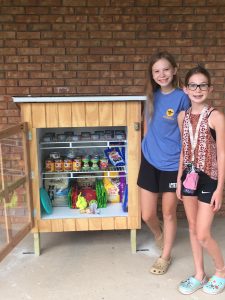
For the 2020 dog walk, Emma decided to use the proceeds to open the Animal Abusive Protection Program Pet Pantry over the summer. The pantry ensures that no local animal will go hungry due to the COVID-19 pandemic.
Emma has been a participant of the University of Illinois at Chicago’s Division of Specialized Care for Children (DSCC) for the last four years. Her mother, Violet, is DSCC’s Family Liaison.
The Wiker family says Emma grew up with a determined spirit and desire to help others. Emma was inspired to start the dog walk in 2014 after seeing a disturbing image of an abused dog that went viral on social media.
Emma handles all the responsibilities of planning and coordinating the dog walk herself and has become a local celebrity. For this year’s walk on July 26, Emma asked her younger sister, Ellen, age 12, to partner with her.
The sisters raised a grand total of $1,978 from this year’s event.
Emma and Ellen worked with community member Jim Roles, who designed, built and donated the pantry.
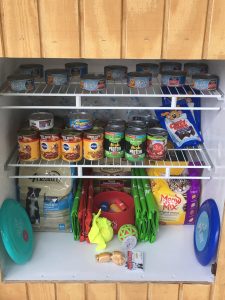
The pet pantry is stocked with food, treats and toys. It is set up for pet owners to take what they need and for others to leave donations as they are able.
The funds raised during the dog walk have helped fill the pantry when community donations run low. Demand at the pantry has been high, with Emma and Ellen stocking the shelves multiple times.
The pet pantry is located in Athens Community Park.
Kudos to Emma and Ellen for helping to fill a genuine need in their community!
Remote Learning Tips and Tools for Families

Resources to help support children and youth of all abilities.
This year’s return to school is a partial or completely virtual experience for many Illinois students amid the COVID-19 pandemic.
Parents and caregivers must navigate how to best support their children and make the school year as engaging and beneficial as possible for their unique needs.
To help families adapt to these unusual circumstances, the Division of Specialized Care for Children team has compiled a list of tips and tools for remote learning in the following categories:
- Students With Disabilities
- General Remote Learning
- Condition-Specific
- Early Childhood
- Transition-Age Youth and Adults
We’ve put these items together in our latest resource roundup newsletter.
You can also find each of these resources and many more learning activities in the “Childcare, Learning and Education Tools” section of our COVID-19 Resource Directory
To subscribe to our newsletter, please complete this brief form.
COVID-19 Memory Book Activity for Families

DSCC provides memory booklet for children and families to complete together during the pandemic.
From school closings to parents suddenly working from home, the coronavirus (COVID-19) pandemic has drastically changed Illinois families’ way of life over the last two months.
To help children express themselves and record their experiences during the Stay at Home Order, we’ve created our own COVID-19 Memory Book that families can print out and complete.
The book includes an “About Me” section for children and youth to fill out as well as their favorite ways to stay busy, what they are thankful for, how they’ve stayed connected with others and a list of celebrations that happened during social distancing. There’s also a page for children to fill out if they celebrated a birthday during the pandemic.
The back page includes information about the COVID-19 resources compiled by the Univesity of Illinois at Chicago’s Division of Specialized Care for Children (DSCC). The resources include links to more at-home learning opportunities and activity resources for families.
Click on the COVID-19 Memory Book link to print the PDF.
The book is also available in Spanish.



